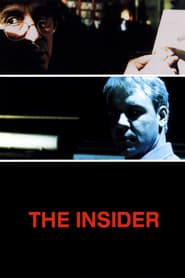Hey, was the sad music re-used for the bleak ending of Layer Cake (2004)? Either way, it was very interesting to watch this whilst the death of Boeing whistleblower John Barnett was breaking news. A tragic suicide, or was this the shadowy machinations of "Big Plane"?
In [1999], The Insider seemed out of touch with the contemporary American sensibility, a vestige of decades-old pessimism whose melancholy spirit and fundamental doubt in the system were a far cry from the more freewheeling fantasy wish-fulfillment offered by a drama like American Beauty, released the same year. [P]erhaps that’s why the film failed at the box office while The Mummy and The Phantom Menace scored big: For a popular culture finally comfortable with ostensibly safe peace and politics, the suggestion that all was not so well in the world might have hit too close to home. [T]he film is basically self-defeating[:] Its own dramatization of the issues, despite appropriately valorizing the efforts of those who dared fight the system, amounts to no more than a fruitless exaltation of dissent. Lowell Bergman and Jeffrey Wigand couldn’t put a dent in Big Tobacco, and neither could Michael Mann. That’s the tragedy that justifies all the skepticism and paranoia in the world.
— Calum Marsh (Slant Magazine)
There is, I admit, a contradiction in a film about journalism that itself manipulates the facts. My notion has always been that movies are not the first place you look for facts, anyway. [I]n its broad strokes, The Insider is perfectly accurate: Big tobacco lied, one man had damning information, skilled journalism developed the story, intrigue helped blast it free. The Insider had a greater impact on me than All the President's Men, because you know what? Watergate didn't kill my parents. Cigarettes did.
Crowe's carefully nuanced, almost opaque performance is the visual and thematic centerpiece of The Insider. We frequently see Wigand in close-ups so extreme we can make out every mole and pore in his face, yet the results of this scrutiny are ambiguous. At the movie's end, we know little more about Wigand and his motives for revealing the secret techniques that his company used to manipulate nicotine delivery in cigarettes than we did at the beginning.[…]
Mann structures The Insider around a masterful series of dreamlike tableaus involving Wigand alone against landscapes suffused with improbable, fluorescent colors. [O]n the most obvious level, these scenes express the character's extreme isolation; [b]ut they also establish The Insider as a study in American light and space, a primarily visual ode to the essential strangeness and loneliness of American life.
[…]
About halfway through the film, we see Wigand on his first day at his new job teaching high school chemistry. [W]igand tells his students that chemistry, to him, is a form of magic. This is not only an allegorical key to the character of this self-described "man of science" but a key to Mann's portrayal of him, which is partly chemical and partly alchemical, a mix of scientific scrutiny and sheer sorcery.
[…]
Gina Gershon [plays] the icy corporate witch who lowers the boom on Bergman and Wallace. [G]ershon is the only woman in the movie who plays any kind of active role in the story, and hers is both tiny and evil. I'm not suggesting that Mann had some obligation to practice affirmative-action casting, especially when telling a story based on actual events, but The Insider inadvertently makes clear just how white and male the upper echelons of business and media remain in this country.
[…]
The film's title is, in the end, ironic. The Jeffrey Wigand we see here is an ordinary upper-middle-class American who makes an extraordinary decision for reasons he doesn't quite understand and whose consequences he can't imagine. For all his insider information, he remains beyond Mann's grasp or ours, unknowable, an outsider.
— Andrew O'Hehir (Salon)

